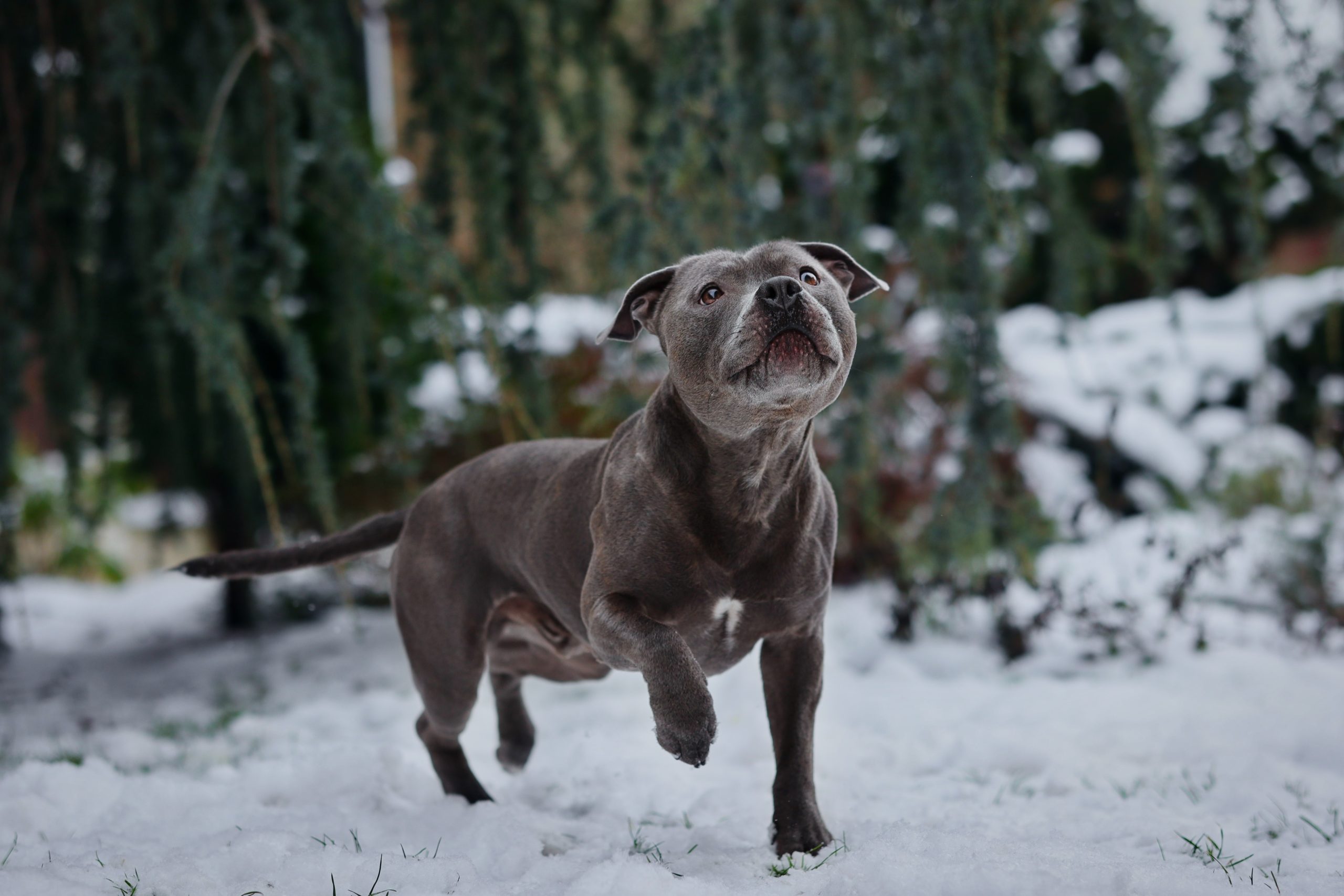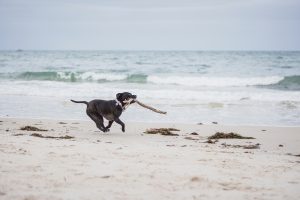Know the Basics of Staffy Puppy Training
Posted on December 15, 2022

Training a puppy can be one of the most rewarding experiences for any pet owner. It is important to start training early to ensure that your pup grows into a well-behaved and obedient adult dog. Staffy puppy training requires patience and consistency, but it is not as hard as it may seem. Here are some basics of training a puppy that will point you in the right direction. If you need more assistance, there’s always online puppy training.
First and foremost, establish yourself as the alpha in the relationship between you and your puppy. This means that you should act confidently around your pup and set boundaries with clear expectations. Your puppy needs to know that you are the leader and that they should respect your rules. Show them through consistent behaviour what kind of behaviour is expected from them, using positive reinforcement when they get something right or negative reinforcement if they do something wrong (like scolding or ignoring).
When teaching basic obedience commands like “sit”, “down”, or “stay”, use treats as rewards for when your pup gets it right. Giving them food rewards helps reinforce good behaviour while also providing an incentive for following your directions. You can also use toys or verbal praise to reward them after successfully completing a task.
In addition to learning basic obedience commands, it is important to work on crate training with your pup so they become comfortable in their own space. Crate training allows for safe confinement when necessary, such as when you leave home or during times when you want them to stay put without getting into trouble. Start off by putting treats inside the crate and encouraging your pup to go inside on their own terms by saying something like “crate time!” Once they understand the concept of going into their crate without being forced, slowly increase how long they stay in there until eventually they feel comfortable enough to spend hours at a time in there without feeling anxious or scared.
Another important part of training a puppy is socialisation. Introducing them to new people, places, animals, situations and items helps shape their development into an adult dog who knows how to behave properly no matter what environment he’s in. To ensure proper socialisation starts early on, take advantage of all opportunities available such as taking walks around the neighbourhood (on leash!), going to parks or pet stores (where appropriate), attending classes specifically designed for puppies at local pet stores/training centres etc.
Finally, always remember that training takes time! Be patient with yourself and don’t expect results immediately; this process takes weeks – sometimes months – of consistent practice before changes start becoming evident in your pup’s behaviour patterns so don’t give up hope if things aren’t moving quickly. Patience is key here – with these tips in mind, soon enough you will have a well-trained pup who listens to you no matter what situation arises.
Featured Posts
Staffy Toys
-
 Bite Resistant Solid Dog Ball Toy
A$39.99 - A$45.99
Bite Resistant Solid Dog Ball Toy Tough Rubber Chew Ball – Built for Dogs That Play Hard Some dogs chew through toys in minutes. This one fights back. The Bite Resistant Solid Dog Ball is shaped from thick natural rubber that takes the pressure of strong jaws while still being safe in the mouth. It’s made for chewing, fetching, and everyday play that keeps dogs busy, fit, and happy. Why Owners Reach for This Chew Ball: • Holds Up to Heavy Chewers - Made from puncture-resistant, non-toxic rubber that keeps its shape even after rough sessions. • Helps Teeth and Gums - The textured surface scrapes away tartar as they bite and presses against the gums to keep them healthier. • Bounces Back with Energy - Springs off the ground and brings life to fetch, turning an ordinary throw into an active chase indoors or outside. • Keeps Dogs Occupied - Takes the edge off boredom, lowers stress, and gives them a safer outlet than chewing shoes or furniture. • Sizes for Every Breed - Available in small, medium, and large so pups of all sizes get the right fit. Product Details: • Material - natural rubber, thick and pet-safe • Sizes - Small, Medium, Large • Design - quiet bounce, flexible build, strong enough to last • Best use - chewing, fetch, training, and enrichment games • Features - durable, non-toxic, helps maintain oral health A Toy That Lasts Longer Safe, sturdy, and more fun to chase than most balls—the Bite Resistant Solid Dog Ball quickly becomes a favourite. Add to Basket today and give your dog a ball that won’t quit before they do.
Bite Resistant Solid Dog Ball Toy
A$39.99 - A$45.99
Bite Resistant Solid Dog Ball Toy Tough Rubber Chew Ball – Built for Dogs That Play Hard Some dogs chew through toys in minutes. This one fights back. The Bite Resistant Solid Dog Ball is shaped from thick natural rubber that takes the pressure of strong jaws while still being safe in the mouth. It’s made for chewing, fetching, and everyday play that keeps dogs busy, fit, and happy. Why Owners Reach for This Chew Ball: • Holds Up to Heavy Chewers - Made from puncture-resistant, non-toxic rubber that keeps its shape even after rough sessions. • Helps Teeth and Gums - The textured surface scrapes away tartar as they bite and presses against the gums to keep them healthier. • Bounces Back with Energy - Springs off the ground and brings life to fetch, turning an ordinary throw into an active chase indoors or outside. • Keeps Dogs Occupied - Takes the edge off boredom, lowers stress, and gives them a safer outlet than chewing shoes or furniture. • Sizes for Every Breed - Available in small, medium, and large so pups of all sizes get the right fit. Product Details: • Material - natural rubber, thick and pet-safe • Sizes - Small, Medium, Large • Design - quiet bounce, flexible build, strong enough to last • Best use - chewing, fetch, training, and enrichment games • Features - durable, non-toxic, helps maintain oral health A Toy That Lasts Longer Safe, sturdy, and more fun to chase than most balls—the Bite Resistant Solid Dog Ball quickly becomes a favourite. Add to Basket today and give your dog a ball that won’t quit before they do. -
 Interactive Dog Flying Disc Toy
A$22.99 - A$47.99
Interactive Dog Flying Disc Toy A Play Partner Made for Dogs That Never Run Out of Energy Bring it outside and even a calm walk can turn into a chase game in no time. Designed for speedy breeds such as Border Collies, Labradors, and German Shepherds dogs that thrive on long runs and fast games. Firm to handle chewing, yet bends in the hand, and shaped so it cuts through the air with a steady flight. Throw it in the park, across a field, or over the sand; your dog burns off energy and you get the fun of playing along. Why Owners Pick This Flying Disc: • Tough but Kind on Teeth - Shaped from rubber that resists chewing. The surface grips easily so dogs can catch and hold it without scraping gums. • Good for Agility and Recall - Great for a straight fetch, a jump-and-catch, or recall drills. Keeps dogs sharp, quick, and burning off energy. • Sizes and Colours to Suit Different Dogs - Made in three sizes 15cm, 18cm, and 22cm so small, medium, and large dogs all get a disc that feels right for them. Available in Blue, Green, Orange, Pink, and Purple bold colours that stand out so it’s easier to see where the disc lands. • Good for Training or Just a Casual Throw - Handy for obedience drills or agility runs, but just as good for a relaxed throw in the yard, field, or on the beach. Product Basics: • Material - flexible rubber strong enough to put up with chewing, yet soft on teeth and gums • Sizes - pick from 15cm, 18cm, or 22cm depending on your dog’s build • Colours - Blue, Green, Light Blue, Grey, Black, Navy, Orange, Pink, Purple • Included - 1 × Interactive Dog Flying Disc Toy What Makes It Worthwhile • Gets the whole body moving for better fitness • Sharpens reflexes and speed • Strong enough to handle biting and tugging • Shaped to sail through the air in a steady line, making mid-flight catches easier for your dog Play That Stays Fresh This disc keeps play lively and fun each time you throw it. Dogs run it down, leap to catch, bring it back, and push for the next throw. Add one to your basket and bring home a toy your dog will keep asking for.
Interactive Dog Flying Disc Toy
A$22.99 - A$47.99
Interactive Dog Flying Disc Toy A Play Partner Made for Dogs That Never Run Out of Energy Bring it outside and even a calm walk can turn into a chase game in no time. Designed for speedy breeds such as Border Collies, Labradors, and German Shepherds dogs that thrive on long runs and fast games. Firm to handle chewing, yet bends in the hand, and shaped so it cuts through the air with a steady flight. Throw it in the park, across a field, or over the sand; your dog burns off energy and you get the fun of playing along. Why Owners Pick This Flying Disc: • Tough but Kind on Teeth - Shaped from rubber that resists chewing. The surface grips easily so dogs can catch and hold it without scraping gums. • Good for Agility and Recall - Great for a straight fetch, a jump-and-catch, or recall drills. Keeps dogs sharp, quick, and burning off energy. • Sizes and Colours to Suit Different Dogs - Made in three sizes 15cm, 18cm, and 22cm so small, medium, and large dogs all get a disc that feels right for them. Available in Blue, Green, Orange, Pink, and Purple bold colours that stand out so it’s easier to see where the disc lands. • Good for Training or Just a Casual Throw - Handy for obedience drills or agility runs, but just as good for a relaxed throw in the yard, field, or on the beach. Product Basics: • Material - flexible rubber strong enough to put up with chewing, yet soft on teeth and gums • Sizes - pick from 15cm, 18cm, or 22cm depending on your dog’s build • Colours - Blue, Green, Light Blue, Grey, Black, Navy, Orange, Pink, Purple • Included - 1 × Interactive Dog Flying Disc Toy What Makes It Worthwhile • Gets the whole body moving for better fitness • Sharpens reflexes and speed • Strong enough to handle biting and tugging • Shaped to sail through the air in a steady line, making mid-flight catches easier for your dog Play That Stays Fresh This disc keeps play lively and fun each time you throw it. Dogs run it down, leap to catch, bring it back, and push for the next throw. Add one to your basket and bring home a toy your dog will keep asking for. -
 Chew Toys For Dog Chewers
A$31.99 - A$38.99
Chew Toys for Dog Chewers Tough, Safe & Eco-Friendly – For Dogs That Like to Chew It's not always easy to find a toy that won't succumb to strong jaws. The Tough Dog Chew Toy is pressed from reinforced bamboo fiber for the durability that will last even the longest chewing sessions. It encourages instinctual chewing, relieves teething discomfort, and maintains better dental health—while providing an eco-friendly option that's safe for your dog. From puppies getting their baby teeth to adult dogs who grind with pressure, this chew captures their attention and keeps them busy. What Pet Parents Love About This Chew Toy: • Made for Strong Chewers—Compressed, dense bamboo fibers can withstand pawing and chewing sessions from younger teething dogs to older dogs that bite down hard. • Eco-Friendly and Safe – Non-toxic, renewable bamboo means this is tough against wear but gentle on a dog's teeth and gums. • Saves Shoes and Furniture – Redirects dogs to a chew toy instead, allowing them to have a solid outlet that keeps them entertained and less interested in household items. • Benefits for Teeth and Gums – Textured ridge detailing works over the teeth to scrape buildup and presses against gums in ways that improve hygiene. • Soothes Teething and Provides Play – Soothing feeling for puppy gums while giving older dogs a chew they can enjoy longer than most. What Sets This Chew Toy Apart: • Strong enough to almost be indestructible • Eco-friendly and chemical-free • Cleans teeth while massaging gums • Keeps dogs busy instead of destructive A Chew That Lasts Strong, safe, and eco-friendly, the Tough Dog Chew Toy gives dogs a reason to chew without destroying what's in your house. Add to cart now so your pup can have an item to chew on that can withstand it.
Chew Toys For Dog Chewers
A$31.99 - A$38.99
Chew Toys for Dog Chewers Tough, Safe & Eco-Friendly – For Dogs That Like to Chew It's not always easy to find a toy that won't succumb to strong jaws. The Tough Dog Chew Toy is pressed from reinforced bamboo fiber for the durability that will last even the longest chewing sessions. It encourages instinctual chewing, relieves teething discomfort, and maintains better dental health—while providing an eco-friendly option that's safe for your dog. From puppies getting their baby teeth to adult dogs who grind with pressure, this chew captures their attention and keeps them busy. What Pet Parents Love About This Chew Toy: • Made for Strong Chewers—Compressed, dense bamboo fibers can withstand pawing and chewing sessions from younger teething dogs to older dogs that bite down hard. • Eco-Friendly and Safe – Non-toxic, renewable bamboo means this is tough against wear but gentle on a dog's teeth and gums. • Saves Shoes and Furniture – Redirects dogs to a chew toy instead, allowing them to have a solid outlet that keeps them entertained and less interested in household items. • Benefits for Teeth and Gums – Textured ridge detailing works over the teeth to scrape buildup and presses against gums in ways that improve hygiene. • Soothes Teething and Provides Play – Soothing feeling for puppy gums while giving older dogs a chew they can enjoy longer than most. What Sets This Chew Toy Apart: • Strong enough to almost be indestructible • Eco-friendly and chemical-free • Cleans teeth while massaging gums • Keeps dogs busy instead of destructive A Chew That Lasts Strong, safe, and eco-friendly, the Tough Dog Chew Toy gives dogs a reason to chew without destroying what's in your house. Add to cart now so your pup can have an item to chew on that can withstand it. -
 Dog Chew Toys For Aggressive Chewers
A$25.99
Dog Chew Toys for Aggressive Chewers Durable Wooden Deer Antler—Natural, Tougher & Safer than Real Bone Finding a chew toy that won't disintegrate in the presence of powerful jaws is harder than you'd think. This Durable Wooden Deer Antler Dog Chew Toy comes pressed from real wood fibers—so it has the grain and density of natural antlers but allows dogs to get the grind and gnaw they're naturally meant to achieve without splintering injury. As an eco-friendly option and one designed to last, this gives chewers who remain determined something to really sink their teeth into. Why Dogs Love This Wooden Antler for Chewing: • Natural & Earth-Friendly – It's formed from compressed wood fibers and is non-toxic to your pup, so there's no risk of plastic. There's even a slight pine smell that wafts at your pup, who loves scents, for extra encouragement. • No Splintering Injuries—It has the sense and feel of a real antler, but it won't split into shards that injure teeth and gums, but instead, it's safe. • Good for Teeth & Gums – It helps scratch plaque off, break up tartar, and work the gums while dogs chew. • Toughened for Aggressive Chewers—It's dense enough to accommodate large-breed pressure, built for jaws that don't quit. • Keeps Teeth & Minds Busy – It diverts chewing away from shoes and table legs, providing a safer alternative for restless dogs looking to exert stress. What Differentiates This Chew from Others: • It allows dogs to engage with their natural impulses. • It cleans as it chews instead of missing areas of the mouth due to other jaw motion (fresh breath guaranteed with gum work). • It's chemical-free, made entirely of wood. • It's strong enough for chew sessions to last a while. Better Than Real Antlers! Offer your dog a chew that satisfies their urge to chew, spares their teeth, and holds up better than cheap alternatives. Add this to your cart for a chew that feels real without the safety hazards.
Dog Chew Toys For Aggressive Chewers
A$25.99
Dog Chew Toys for Aggressive Chewers Durable Wooden Deer Antler—Natural, Tougher & Safer than Real Bone Finding a chew toy that won't disintegrate in the presence of powerful jaws is harder than you'd think. This Durable Wooden Deer Antler Dog Chew Toy comes pressed from real wood fibers—so it has the grain and density of natural antlers but allows dogs to get the grind and gnaw they're naturally meant to achieve without splintering injury. As an eco-friendly option and one designed to last, this gives chewers who remain determined something to really sink their teeth into. Why Dogs Love This Wooden Antler for Chewing: • Natural & Earth-Friendly – It's formed from compressed wood fibers and is non-toxic to your pup, so there's no risk of plastic. There's even a slight pine smell that wafts at your pup, who loves scents, for extra encouragement. • No Splintering Injuries—It has the sense and feel of a real antler, but it won't split into shards that injure teeth and gums, but instead, it's safe. • Good for Teeth & Gums – It helps scratch plaque off, break up tartar, and work the gums while dogs chew. • Toughened for Aggressive Chewers—It's dense enough to accommodate large-breed pressure, built for jaws that don't quit. • Keeps Teeth & Minds Busy – It diverts chewing away from shoes and table legs, providing a safer alternative for restless dogs looking to exert stress. What Differentiates This Chew from Others: • It allows dogs to engage with their natural impulses. • It cleans as it chews instead of missing areas of the mouth due to other jaw motion (fresh breath guaranteed with gum work). • It's chemical-free, made entirely of wood. • It's strong enough for chew sessions to last a while. Better Than Real Antlers! Offer your dog a chew that satisfies their urge to chew, spares their teeth, and holds up better than cheap alternatives. Add this to your cart for a chew that feels real without the safety hazards. -
 Tough Octopus Plush Dog Toy
A$48.99
Tough Octopus Plush Dog Toy Durable Construction, Playful Design The Octopus is more than a regular plush toy; it's stitched to withstand doggy bites, tugs, and thrashing. Inside the head contains a squeaker, while the tentacles are lined with a crackly material that gives dogs something to munch on. Plus, there's no stuffing inside—which means no fluff flying out all over your floor. Why Dog Owners Love This Octopus: • No Stuffing = No Mess—Nothing for your dog to pull apart, nothing for your dog to swallow. That means safer play and less cleanup in your living room. • Squeaker & Crackly Tentacles—A squeaker inside the head and crinkle sewn into the tentacles provide the noise and texture dogs crave and return to. • Durable Construction—Composed of plush polyester with reinforced stitching. It's ready for tug-of-war and chomping while you urge them on. • Good for Teeth & Gums—The fabric's coarse enough to bring to teeth and gums, scraping off residue as they chew. • Non-Toxic & Machine Wash Safe—Made of non-toxic materials with food-safe dyeing. When it gets dirty, toss it in the washing machine. Includes: • 1 × Octopus Plush Dog Toy • Head squeaker and crackly tentacles Features: • No stuffing—no mess • Squeaky head & crackly tentacles—never gets boring • Reinforced seams—stronger than average plush toys • Coarse fabric—cleans dog’s teeth and gums • Non-toxic plush—safe for everyday use A Toy That Will Last Longer! With noise, crunch, and tugging capabilities combined into one toy, this octopus can be chewed, shaken, and carried around without falling apart like a typical plush would. Add one to your cart to give your dog a toy they’ll keep bringing back for more!
Tough Octopus Plush Dog Toy
A$48.99
Tough Octopus Plush Dog Toy Durable Construction, Playful Design The Octopus is more than a regular plush toy; it's stitched to withstand doggy bites, tugs, and thrashing. Inside the head contains a squeaker, while the tentacles are lined with a crackly material that gives dogs something to munch on. Plus, there's no stuffing inside—which means no fluff flying out all over your floor. Why Dog Owners Love This Octopus: • No Stuffing = No Mess—Nothing for your dog to pull apart, nothing for your dog to swallow. That means safer play and less cleanup in your living room. • Squeaker & Crackly Tentacles—A squeaker inside the head and crinkle sewn into the tentacles provide the noise and texture dogs crave and return to. • Durable Construction—Composed of plush polyester with reinforced stitching. It's ready for tug-of-war and chomping while you urge them on. • Good for Teeth & Gums—The fabric's coarse enough to bring to teeth and gums, scraping off residue as they chew. • Non-Toxic & Machine Wash Safe—Made of non-toxic materials with food-safe dyeing. When it gets dirty, toss it in the washing machine. Includes: • 1 × Octopus Plush Dog Toy • Head squeaker and crackly tentacles Features: • No stuffing—no mess • Squeaky head & crackly tentacles—never gets boring • Reinforced seams—stronger than average plush toys • Coarse fabric—cleans dog’s teeth and gums • Non-toxic plush—safe for everyday use A Toy That Will Last Longer! With noise, crunch, and tugging capabilities combined into one toy, this octopus can be chewed, shaken, and carried around without falling apart like a typical plush would. Add one to your cart to give your dog a toy they’ll keep bringing back for more! -
 Dog Pull Ring Toy
A$24.99
Dog Pull Ring Toy for Training & Biting Resistance Made for Tug, Training and Dogs That Never Slow Down The Pull Ring takes a dog’s energy and gives it direction. Good for tug, fetch, and training, it can handle the pull of breeds like German Shepherds, Border Collies, and Labradors. Dogs get the resistance they want, and you get a way to guide that strength while building trust. Why Owners Reach for It: • Built for Heavy Chewers - Reinforced plastic, thick and solid, stands up to long chewing and hard pulling. • Training Tool - Helps with basics like fetch, drop, and release. Keeps dogs tuned in while you run the drill. • Better Outlet for Energy - Takes chewing, barking, or digging and turns it into play you can both enjoy. • Grip That Holds - It holds firm in your grip so you can stay in control during tug play, even when the dog pulls hard. • Indoor or Out - Fine for the living room or garden. Just as good at the park or down by the beach. Product Notes: • Material - reinforced plastic that resists chewing • Size - works best for bigger, active dogs • Uses - tug, chase, fetch, training What Makes It Worthwhile: • Keeps dogs busy and sharp • Builds trust through shared play • Handles long chewing and tugging bouts • Works as a simple training aid Train Hard, Play Hard This ring brings shape to play. Strong enough to take pressure, plain enough that dogs keep coming back for it. Add one to your basket and see how your dog runs with it.
Dog Pull Ring Toy
A$24.99
Dog Pull Ring Toy for Training & Biting Resistance Made for Tug, Training and Dogs That Never Slow Down The Pull Ring takes a dog’s energy and gives it direction. Good for tug, fetch, and training, it can handle the pull of breeds like German Shepherds, Border Collies, and Labradors. Dogs get the resistance they want, and you get a way to guide that strength while building trust. Why Owners Reach for It: • Built for Heavy Chewers - Reinforced plastic, thick and solid, stands up to long chewing and hard pulling. • Training Tool - Helps with basics like fetch, drop, and release. Keeps dogs tuned in while you run the drill. • Better Outlet for Energy - Takes chewing, barking, or digging and turns it into play you can both enjoy. • Grip That Holds - It holds firm in your grip so you can stay in control during tug play, even when the dog pulls hard. • Indoor or Out - Fine for the living room or garden. Just as good at the park or down by the beach. Product Notes: • Material - reinforced plastic that resists chewing • Size - works best for bigger, active dogs • Uses - tug, chase, fetch, training What Makes It Worthwhile: • Keeps dogs busy and sharp • Builds trust through shared play • Handles long chewing and tugging bouts • Works as a simple training aid Train Hard, Play Hard This ring brings shape to play. Strong enough to take pressure, plain enough that dogs keep coming back for it. Add one to your basket and see how your dog runs with it. -
 Indestructible Squeaky Plush Dog Toy
A$25.99
Indestructible Squeaky Plush Dog Toy Tough Enough to Chew, Soft Enough to Cuddle A toy that lasts—give your dog the Indestructible Squeaky Plush Dog Toy! Made of sturdy corduroy and a soft fabric exterior, this resilient yet cuddly dog toy is soft enough to snuggle with while being squeak resistant, making it an ideal option for dogs who love playing fetch, tugging, or chewing. Perfect for all pups, big and small! Why Dogs & Owners Love This Toy: • Creature-Inspired Shapes—Fun animal shapes appeal to a dog's senses while wagging their tails. • Hidden Squeaker—The hidden squeaker provides sound to entice dogs into chasing and biting the toy as they beg for more. • Great for Teeth & Gums—The textured fabric weaves brush teeth and poke at gums to scrape away plaque and improve mouth freshness. • Durable Design—Made of corduroy and other sturdy materials with tight stitching that keeps it together when pulled or bitten. • Ideal For All Dogs—Available in multiple sizes for small, medium, and large breeds. Machine washable and good as new after every round! Why This Plush Toy Is Continually Effective: • Get dogs off the couch • Fabric is soft enough on gums but still tough enough for chewing • Great for bonding/training or merely for fun • Prevents boredom and avoids chewing on your socks and home furniture Tough but Still Cuddly It's much more than a chew toy. It's a companion that can keep your dog occupied, serve as comforting support they carry around, and be an outlet for chewing frustration while preserving your shoes and furniture. Add one to your cart today and get your pup a toy they'll love over and over!
Indestructible Squeaky Plush Dog Toy
A$25.99
Indestructible Squeaky Plush Dog Toy Tough Enough to Chew, Soft Enough to Cuddle A toy that lasts—give your dog the Indestructible Squeaky Plush Dog Toy! Made of sturdy corduroy and a soft fabric exterior, this resilient yet cuddly dog toy is soft enough to snuggle with while being squeak resistant, making it an ideal option for dogs who love playing fetch, tugging, or chewing. Perfect for all pups, big and small! Why Dogs & Owners Love This Toy: • Creature-Inspired Shapes—Fun animal shapes appeal to a dog's senses while wagging their tails. • Hidden Squeaker—The hidden squeaker provides sound to entice dogs into chasing and biting the toy as they beg for more. • Great for Teeth & Gums—The textured fabric weaves brush teeth and poke at gums to scrape away plaque and improve mouth freshness. • Durable Design—Made of corduroy and other sturdy materials with tight stitching that keeps it together when pulled or bitten. • Ideal For All Dogs—Available in multiple sizes for small, medium, and large breeds. Machine washable and good as new after every round! Why This Plush Toy Is Continually Effective: • Get dogs off the couch • Fabric is soft enough on gums but still tough enough for chewing • Great for bonding/training or merely for fun • Prevents boredom and avoids chewing on your socks and home furniture Tough but Still Cuddly It's much more than a chew toy. It's a companion that can keep your dog occupied, serve as comforting support they carry around, and be an outlet for chewing frustration while preserving your shoes and furniture. Add one to your cart today and get your pup a toy they'll love over and over! -
 Interactive Dog Training Ball
A$36.99
Interactive Dog Football Training Ball & Chew Toy A Football Made for Dogs Who Chase and Chew More than something to boot across the yard, this football is made from heavy leather and shaped for tug, chase, and fetch. It gives dogs a way to use up energy and stay occupied. Kick it through the park, roll it over the lawn, or pull it down a dirt track—wherever it goes, the game changes shape. Why Owners Reach for It: • Leather That Lasts - Dense hide holds strong against chewing and pulling but still feels safe on teeth. • The Bounce Keeps Them Alert - Because of its shape, the roll never looks the same twice, so dogs need to stay sharp on their paws. • Play With a Purpose - Good for recall, fetch, or tug sessions. It works both body and mind, while steering chewing away from shoes or furniture. • Takes the Outdoors in Stride - It takes on grass, sand, and dirt without giving in, ready to follow you anywhere you play. • Picking a Size - Comes in 15cm for small breeds and 19cm for the larger ones, so every dog ends up with a size that fits. The Basics: • Material - tough leather built to cope with chewing • Sizes - 15cm and 19cm • Best Use - fetch, chase, tug, training games • For - small through large breeds What Makes It Handy: • Keeps dogs moving and fit • Sharpens focus and balance • Holds up to long chewing spells • Strong build that’s still safe on teeth Time to Play A football that ties together exercise, training, and fun in one toy. Drop one in your basket and see how your dog takes to it.
Interactive Dog Training Ball
A$36.99
Interactive Dog Football Training Ball & Chew Toy A Football Made for Dogs Who Chase and Chew More than something to boot across the yard, this football is made from heavy leather and shaped for tug, chase, and fetch. It gives dogs a way to use up energy and stay occupied. Kick it through the park, roll it over the lawn, or pull it down a dirt track—wherever it goes, the game changes shape. Why Owners Reach for It: • Leather That Lasts - Dense hide holds strong against chewing and pulling but still feels safe on teeth. • The Bounce Keeps Them Alert - Because of its shape, the roll never looks the same twice, so dogs need to stay sharp on their paws. • Play With a Purpose - Good for recall, fetch, or tug sessions. It works both body and mind, while steering chewing away from shoes or furniture. • Takes the Outdoors in Stride - It takes on grass, sand, and dirt without giving in, ready to follow you anywhere you play. • Picking a Size - Comes in 15cm for small breeds and 19cm for the larger ones, so every dog ends up with a size that fits. The Basics: • Material - tough leather built to cope with chewing • Sizes - 15cm and 19cm • Best Use - fetch, chase, tug, training games • For - small through large breeds What Makes It Handy: • Keeps dogs moving and fit • Sharpens focus and balance • Holds up to long chewing spells • Strong build that’s still safe on teeth Time to Play A football that ties together exercise, training, and fun in one toy. Drop one in your basket and see how your dog takes to it. -
 Bite Resistant Dog Rope Toy
A$29.99
Bite Resistant Dog Rope Toy A Rope That Can Cop It All Dogs chew, yank, and chase until toys are in pieces. This rope hangs in there. Thick cotton strands twisted together take on sharp teeth, tug battles, and fetch runs without giving way. While the dog’s busy working it over, your chair legs get a break, and their teeth get a bit of a scrub. Works for pups easing sore gums and for little dogs that chew like it’s their main job. Why Owners Keep Coming Back: • Built to Handle Chewers - Tough cotton fibres stay put even after hours of gnawing, dragging, and pulling. • Burns Off Energy - Some dogs chase it across the yard, others rope you into a tug on the rug, and plenty just sit and chew—whatever the style, it drains that extra energy and often leaves them sprawled out. • Helps Teeth Stay in Shape - The rough threads slide between teeth and press on gums, scraping off muck and freshening breath as they chew. • Knots That Work - Chunky knots are easy for dogs to clamp down on and give you something solid to - grab when you jump in. • Nothing Added - Plain cotton rope, that’s it. Soft on the mouth, tough enough to stick around long after cheaper toys snap. Product Details: • Made with - strong cotton rope • Length - 18cm – suits puppies and smaller breeds • Style - made for tug games and chewing sessions • Good match for - pups cutting teeth, small dogs, and determined chewers • Features - light to carry, long-lasting, teeth-kind What Makes It Different: • Stays in one piece after daily play • Cleans teeth while they chew, no extra effort needed • Turns play into something shared, not just watched • Fits small dogs with oversized chewing habits Ready for Real Play It does plenty—soothes sore gums, holds its ground in tug contests, and doesn’t give up mid-game. It keeps the dog busy, gives their teeth some care, and spares the sofa legs from becoming a target. Pick one up today and let your pup chew, chase, and drag this rope around the house. Better this than your slippers.
Bite Resistant Dog Rope Toy
A$29.99
Bite Resistant Dog Rope Toy A Rope That Can Cop It All Dogs chew, yank, and chase until toys are in pieces. This rope hangs in there. Thick cotton strands twisted together take on sharp teeth, tug battles, and fetch runs without giving way. While the dog’s busy working it over, your chair legs get a break, and their teeth get a bit of a scrub. Works for pups easing sore gums and for little dogs that chew like it’s their main job. Why Owners Keep Coming Back: • Built to Handle Chewers - Tough cotton fibres stay put even after hours of gnawing, dragging, and pulling. • Burns Off Energy - Some dogs chase it across the yard, others rope you into a tug on the rug, and plenty just sit and chew—whatever the style, it drains that extra energy and often leaves them sprawled out. • Helps Teeth Stay in Shape - The rough threads slide between teeth and press on gums, scraping off muck and freshening breath as they chew. • Knots That Work - Chunky knots are easy for dogs to clamp down on and give you something solid to - grab when you jump in. • Nothing Added - Plain cotton rope, that’s it. Soft on the mouth, tough enough to stick around long after cheaper toys snap. Product Details: • Made with - strong cotton rope • Length - 18cm – suits puppies and smaller breeds • Style - made for tug games and chewing sessions • Good match for - pups cutting teeth, small dogs, and determined chewers • Features - light to carry, long-lasting, teeth-kind What Makes It Different: • Stays in one piece after daily play • Cleans teeth while they chew, no extra effort needed • Turns play into something shared, not just watched • Fits small dogs with oversized chewing habits Ready for Real Play It does plenty—soothes sore gums, holds its ground in tug contests, and doesn’t give up mid-game. It keeps the dog busy, gives their teeth some care, and spares the sofa legs from becoming a target. Pick one up today and let your pup chew, chase, and drag this rope around the house. Better this than your slippers.





